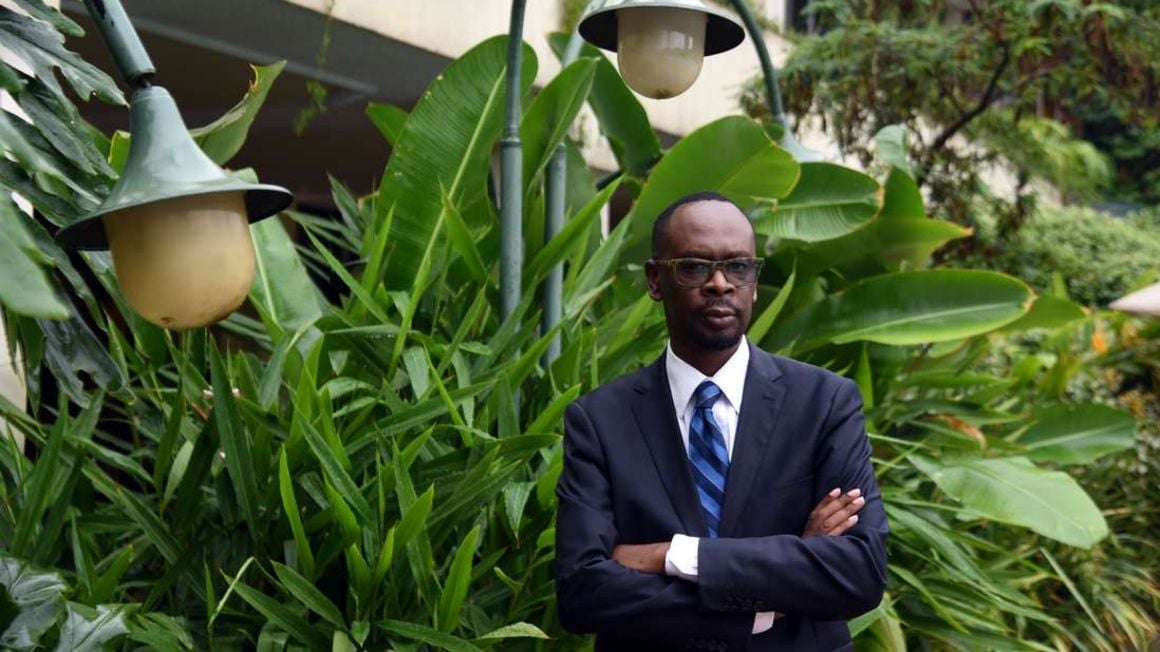
Omwanza Ombati a lawyer at the Nairobi Serena on February 9. PHOTO | DIANA NGILA | NMG
Summary
- Omwanza Ombati shows up at Serena Hotel for breakfast wearing a sharp suit, attempting to cover layers and layers of hurt.
- He lost his father last year, his best friend, and although he does not wear it on his sleeves, he is in the ugly eye of a storm of grief. A season of mourning.
- He has been a partner at Nchogu Omwanza and Nyasimi Advocates for over a decade. He met JACKSON BIKO for a chat about life and this period he is in.
Omwanza Ombati shows up at Serena Hotel for breakfast wearing a sharp suit, attempting to cover layers and layers of hurt.
He lost his father last year, his best friend, and although he does not wear it on his sleeves, he is in the ugly eye of a storm of grief. A season of mourning.
He has been a partner at Nchogu Omwanza and Nyasimi Advocates for over a decade. He met JACKSON BIKO for a chat about life and this period he is in.
***
You must be SDA.{Seventh Day Adventist}
Yes. I’m SDA.
Are you a good SDA?
(Laughs) Well, I try to practise most of those things that I was taught. But I’m not a regular churchgoer. I’m certainly not your SDA posterboy. (Chuckles)
What’s the season you are in life, right now?
Season of grief. Losing a father, for a man, is very consequential. It’s as if a part of you dies. He had been sick for close to eight years. I lived with my father in my house the past year, while he was unwell and finally when he was just about to die he told me that he needed to go home. So he went home.
He called his friends, family, I think as a way of saying goodbye. Then he died. We were very close. (Pause) Death is a funny thing because even though I saw it coming, I saw him wither each day, wasting away, it still knocked me off balance.
You have to then learn to cope with loss. You know the stages of grief they talk about, I don’t think they are in any particular order. (Chuckles) It’s all mixed up. It’s only orderly in writing. In real life, it’s a mess.
What kind of a man was he?
My dad? He was a peasant. I’m the son of a peasant. I grew up in a village in Nyamira. I went to school there. My dad was a farmer, my mom a nurse. I have two sisters who are all married, which means I’m the one left in the boma to represent my dad in his matters.
They are big shoes to fill. He was resilient. He was in and out of the Intensive Care Unit so many times, each we thought he wouldn’t come out, but he did. He had nine lives.
What have you learnt about yourself during this period of grief?
(Laughter) Wow. (Pause). That’s an interesting question. I think you probably learn that you’re not as strong as you thought. I think grieving is a confusing process.
You are a litigator?
Yes. I solve disputes either in court or in tribunals or arbitration.
What’s the rule of thumb in litigating?
To expect anything. There is nothing like a sure case. (Laughter) When you’re younger you get affected when you lose court cases. You take it personally. But as you grow older, you realise that there are only two outcomes. Somebody has to lose and somebody has to win.
Unfortunately or fortunately, as a lawyer, people come to you with a lot of expectations. And you carry their burdens.
I think lawyers are more like doctors in the sense of trying to solve human conflict or whatever that is brought to your desk. So you have that and I think you need to tell your clients that there are two outcomes. And you need to expect that.
As a litigator who has been solving disputes for 15 or so years, do you find that you are better at solving your marital disputes than other men?
No. (Laughter) You know marital disputes are driven by totally different sets of values. (Chuckles) It could be anger, it could be jealousy, resentment, hurt, whatever. You can’t apply work to it. You just have to find what works in your person.
What’s your biggest challenge raising teenage girls?
We went to the dentist the other day when the girls were on a short break and they were unhappy that I had scheduled the appointment without informing them. They told me, ‘dad, you have interfered with our schedule.’ (Chuckles) They are no longer babies, they are people with schedules.
(Laughs) They were sweet when they were younger, then they became teenagers and they’re different and unique human beings. As a father of teenagers, it is a sensitive period and a learning curve for me.
When were you the happiest in your life?
The final year of university. I was doing well, I had great hopes for my career. I was also dating then. That and when my first-born was born—as a new father. It was a time that I was getting something that was truly new and innocent in my life. I remember crying.
What does your wife find most irritating about you?
She says I’m an extreme idealist. (Laughter) I take a position and I’m not willing to move from there. She also says that I’m temperamental.
Do these qualities really serve you well as a litigator? Or are they the qualities that also make you a good litigator?
I think so. You take a strong position and you support it. You qualify it. I would call it my strength.
And probably that’s the reason why I’m not this posterboy for SDA (laughter) because I would listen to the pastor, and if I was not convinced by what he was teaching I’d question it. Because God gave us brains also. He didn’t create sheep.
What do you want now at 42?
Legacy. I think I’m starting to think about legacy. I’m thinking about building something that obviously will outlast me in terms of business. Something that will impact society. Not as a politician. Something quiet. Something like what James Mwangi {Equity Bank CEO} does but localised. But it has to be low-key.
If you’re giving to society then you don’t need to shout. That now is my SDA upbringing speaking. (Laughs) If you’re helping somebody you don’t want to tell everybody that’s what you’re doing. You can do it quietly. So I’m looking out for legacy, the next 20 or 30 years.
Would you say that you are self-actualised?
I don’t know. (Pause) I was lucky that my career picked up very early on. I worked hard, yes, but I think luck has played a major role in it. If I look at my classmates, I wasn’t the smartest, neither did I work harder than everybody else.
I think you need a bit of luck in your life but you also have to find it because it’s not going to reveal itself. You have to recognise it. So once you recognise it, I think, then it works.
If you’re offered a chance to meet somebody for dinner, two hours, dead or alive, who would that be and what would you ask them?
That’s a very interesting question. (Pause) Mother Teresa. I would want to know what moved her to completely dedicate her life to helping the destitute. Because of her, I truly believe happiness can be achieved not only through money but through doing things as she did.
What are you most insecure about as a man?
Being poor. Poverty dehumanises you; you’re not able to do basic things for your family, or yourself, But once you make it, you should be able to recognise where you’ve come from. You should never forget that place. It should always be your Northern star.
Where or when are you most at peace, a place you are unencumbered, where you are truly connected to yourself?
I love landscaping. I have a small place in Elementaita. I did the grounds. I put up a small caravan there. I might do some tents later, but for now, I just have a caravan. It’s very small.
I go there once in a while, to be away from Nairobi. I listen to music. When I was doing my Master’s degree that’s where I used to go and sit and read. I light a fire. I read. That’s where I think of life, and what legacy I’m leaving behind.
There is something to be said about that. That it takes you leaving your big house here in Nairobi with all its trappings to go to a small caravan you can hardly swing a cat in to go deep into yourself.
Yes. It can get noisy. You get distracted.





No comments :
Post a Comment